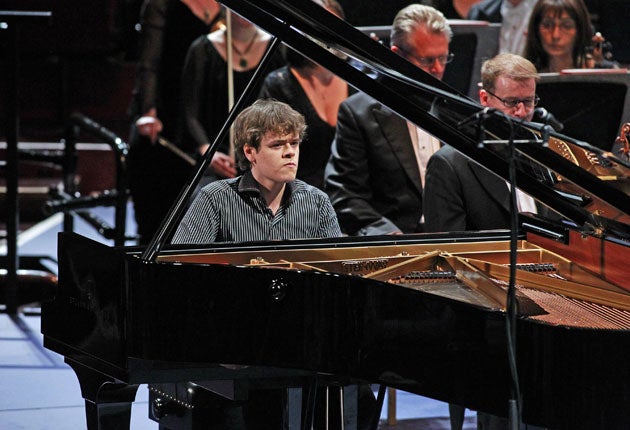First Night of the Proms, Royal Albert Hall, London
After a slow start, the boy wizard brings magic to the piano

Your support helps us to tell the story
From reproductive rights to climate change to Big Tech, The Independent is on the ground when the story is developing. Whether it's investigating the financials of Elon Musk's pro-Trump PAC or producing our latest documentary, 'The A Word', which shines a light on the American women fighting for reproductive rights, we know how important it is to parse out the facts from the messaging.
At such a critical moment in US history, we need reporters on the ground. Your donation allows us to keep sending journalists to speak to both sides of the story.
The Independent is trusted by Americans across the entire political spectrum. And unlike many other quality news outlets, we choose not to lock Americans out of our reporting and analysis with paywalls. We believe quality journalism should be available to everyone, paid for by those who can afford it.
Your support makes all the difference.The First Prom, like the Last Prom, is all about gesture, but this one began with a specially commissioned work which would have earned nul point on any scale.
Judith Weir's normal style is quirky and original, but her four-minute fanfare – performed by the BBC Symphony Orchestra and the BBC Symphony Chorus under the baton of Jiri Belohlavek – was like some terrible windy exhumation by William Walton. Brahms's Academic Festival Overture, which followed, was at least a pièce d'occasion with some fibre.
But this wasn't why the queues for standing room had been snaking hundreds of yards down the street. The real reason was diminutive 19-year-old Benjamin Grosvenor, the Andy Murray of British pianism, who would be the youngest-ever soloist to play at the opening Prom.
Grosvenor has been groomed like a racehorse since his precocious win in the BBC Young Musician of the Year contest at 11: his parents and his tutors at the Royal Academy have wisely kept him out of the limelight until now, but he can no longer escape it. Last week Decca released his Chopin and Liszt debut disc, and journalists have been trying to set him up as a musical radical, but all he wants to do is play. "I'm not that talented," he recently observed with engaging modesty.
He is extremely talented. But his virtuosity is a delicate affair, ideally suited to intimate gatherings: the only question, as he launched into Liszt's second piano concerto, was whether he would find a big enough sound to conquer the hall's notoriously unfriendly acoustic. The work itself shows Liszt both at his visionary best and at his most thumpingly banal: Grosvenor's job was to create a space for himself, and, in the long stretches where the orchestra was just providing a backdrop, to make every note glow.
This he did with pearlised scales and cascades, but even in the nearest stalls we had to strain our ears; there is drama in this piece, but Grosvenor didn't bring it out because his tempi were too fast. As he took his bow in his Little Lord Fauntleroy jacket, the whole thing felt like a toe-dipping exercise, both for him and for us.
Then he sat down again – and was transformed. His encore was one of Brahms's Hungarian Rhapsodies, as arranged by that fleet-fingered Hungarian-Gypsy wizard Georges Cziffra. Using it to weave exquisite filigree patterns in the air, Grosvenor became a wizard too.
Join our commenting forum
Join thought-provoking conversations, follow other Independent readers and see their replies
Comments